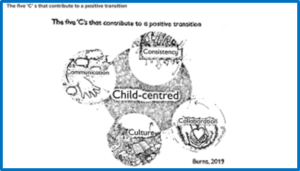The statement below which is detailed in the Scottish Early Childhood and Families Transitions Statement produced by Education Scotland.
In today’s world children and families experience more transitions than ever before. Early childhood and family transitions influence children’s day-to-day experiences and may have longer term impact.
Therefore, we have decided to attempt to work with our current families to help them engage with the early education system in Scotland and prepare the families and children for school.
A small number of our families, especially those from Romainia and Slovakia, choose to take the opportunity to access nursery education, if they are indeed successful in gaining nursery place in the local overpopulated area. Therefore, we saw the need for an early intervention project that would allow pre-school children to engage with play in the school setting which would also enhance the transition into Primary 1.
As a starting point for this we identified a staff member who would be best placed to engage with families, the local nursery and the children themselves.
Next step was to identify which children, currently enrolled in our school, had younger siblings, their dates of birth and if they were accessing nursery education. Further to this, communication with our local nursery opened for this year, where we worked together to identify which children would be registering for our school for the following session.
Research to inform our practice
To support this intervention, we will draw on the guidance and structure from the Scottish Early Childhood and Families Transitions Statement produced by Education Scotland as mentioned previously.
This document suggests that there are five C’s that contribute to a positive transition, as illustrated below.
A child centered approach will be key to the development of our intervention unpacked in the following way.
Communication – We will ensure the children and families are always aware of the date and timings of the playgroup through messages, flyers and oral communication (through an interpreter if required). Information about the group will also be shared with the other members of staff at arranged collegiate meetings. In addition, mutual communication from the families with us in school will be considered as we build on our existing positive and trusting relationships to support transitions further.
Consistency – This aspect will play a massive part in our transition development. We aim to share the importance of consistency with our families in school and at home. A consistent approach to play and sharing the play experiences with the children at home will be promoted as key to the children’s development and ultimately support attainment long term.
Collaboration – Working with families. As our intervention develops, we aim to incorporate work with the following principles and take views and opinions of our families though surveys and weekly recording of comments made about playgroup in our Big Book.
The Six Principles
The statement elaborates six principles with the intention that they are all valued and respected through mutual knowledge sharing:
- aspirations
- entitlements
- expectations
- participation
- opportunities
- contribution
Culture – Further to exploring these principles with our engaging families we aim to continue to further develop relationships with members of the community and services that engage with our families and support them with cultural issues that may arise. This will allow us to work with an asset based approach to all members of our school community.
Impact
We predict that we will see an increase in the ‘readiness’ for school in our pupils in August 2023 due to the experiences they have been exposed to in playgroup, along with the social skills they will have gained and the confidence they will have built in being in a school environment which most children in previous years have not had.
This will then allow the Learning and Teaching to be adapted in Primary 1 to consider the skills the children have already gained through the playgroup as well as the skills they have gained in the family home and outside the school environment.
We aim to see a long term impact on the transition process into school which we would anticipate will have an influence on our attainment in P1 and beyond.

